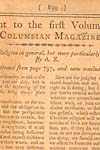Gimme That Olde Tyme Lingo

Q. When I read an old text, such as the Declaration of Independence, I practically get whiplash from all the capital letters that keep my head bouncing up and down. Why were they so much in love with capitals?
A. Let's take a look at a sentence that will confirm your impression:
"WHEN in the Course of human Events, it becomes necessary for one People to dissolve the Political Bands which have connected them with another, and to assume among the Powers of the Earth, the separate and equal Station to which the Laws of Nature and of Nature's God entitle them, a decent Respect to the Opinions of Mankind requires that they should declare the causes which impel them to the Separation."
Using uppercase letters was simply a convention of 18th century printing. Notice that the words capitalized (except for When) are all nouns; that was their practice. Within a sentence, our practice is to capitalize only those nouns which are proper names.
Aside from convention, it actually seems to have helped people read better, especially foreigners. Sometimes the same spelling is used for a noun and a verb, so if the noun is capitalized and the verb is not (Respect/respect) there is an unmistakable signal. Additionally, there are some pronunciation shifts depending on the part of speech:
- Digest/digest
- Bow/bow
- Lead/lead
- Refuse/refuse, etc.
A related question came in soon afterwards:
Q. In old documents, the letter –s often looks like an –f, as in fuccefs for success. What was going on?
A. Printers imitated a fancy script –s from earlier scribes, mostly because it led to pleasing letter combinations. The –f version of the letter also had a sibilant sound, and it was called the long or medial -s. We have to use the letter –f to represent it, but it was a letter unto itself, with a very short crossbar. The general rule was this: use the medial –s at the beginning of a word or inside a word, but use the small –s as the last letter of a word.
Here's an example from Thomas Paine's Common Sense:
"Perhaps the ƒentiments contained in the following pages are not yet ƒufficiently faƒhionable to procure them general favor...."
Coincidence or not, the same thing happened in Greek, where an initial or internal sigma had one form (σ), and the sigma at the end of a word had another (s).
Check out Mike's latest book here: http://arbutuspress.com/


Comments